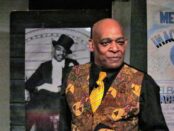Orson’s Shadow
For those interested in both theatrical history and the lives of our former artistic heroes, Pendleton doesn’t disappoint, even if he exaggerates and manipulates the facts a bit. He does better with Welles and Olivier, both played smartly and quirkily, than he does with Taff’s almost invisible Plowright and Menna’s ghostly, but glamorous Leigh. Hamilton’s Tynan is more didactic than dramatic, but he looks terrific and keeps the show rolling along. Listening to these giants kvetch and spew is fascinating and strangely satisfying. [more]












